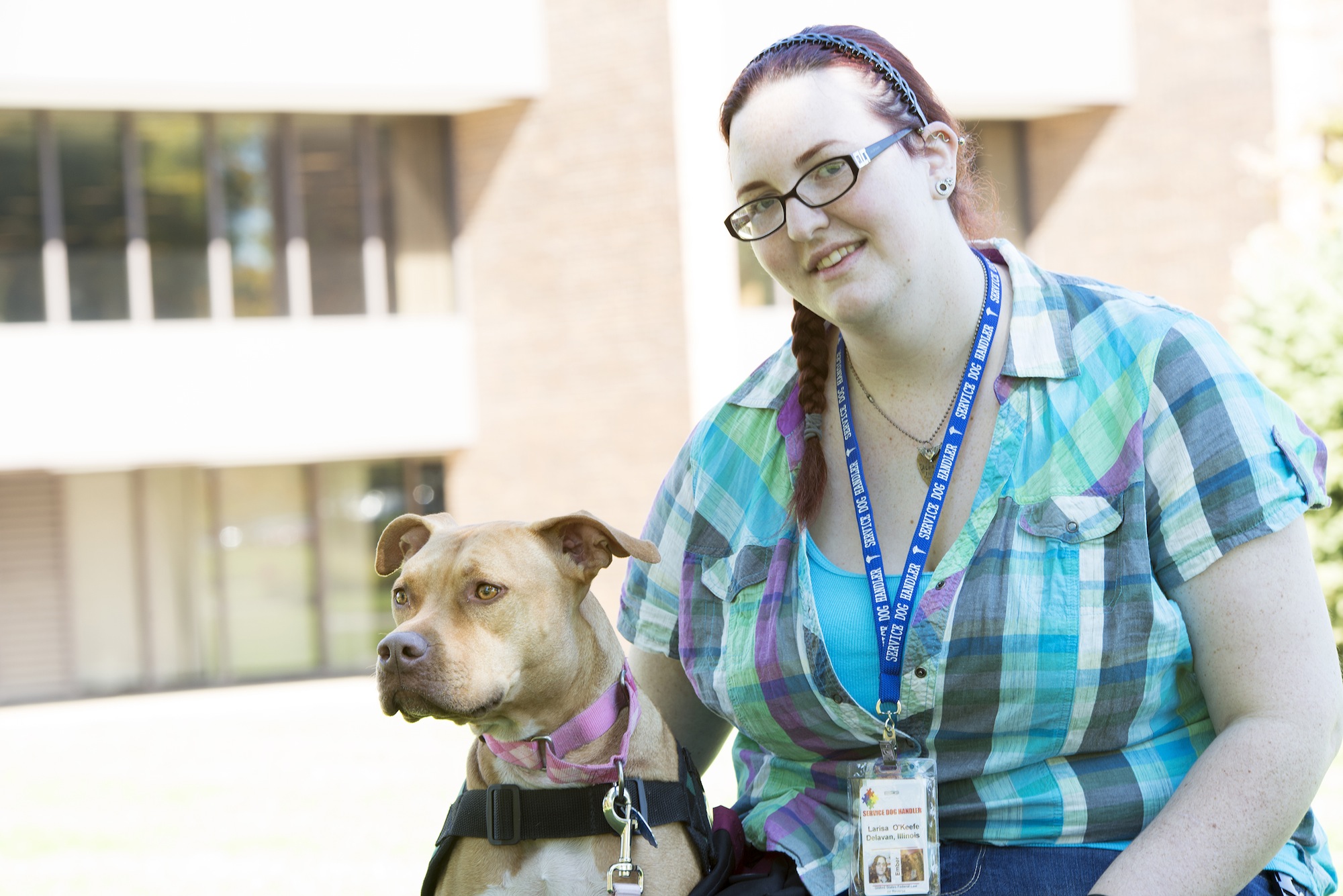Teaching Old Dogs New Tricks: Larisa O’Keefe

Photo Courtesy PAUL GONSTAL
EAST PEORIA — People tend to turn and look as Larisa O’Keefe walks by in the halls of Illinois Central College, but it is not her that catches their eye, it is O’Keefe’s four-year-old, Ember. While any four-year-old would attract a bit of attention in a college, Ember is especially noticeable because she’s a little pit bull, literally.
Perhaps the reason that having a dog in the halls of ICC seems odd is that, frankly, it’s prohibited by Campus Police. 25-year-old O’Keefe isn’t at risk of getting in trouble though because Ember is no ordinary pooch. She trains public-access service dogs for people with special needs, and Ember is one of these special canines.
O’Keefe said that she feels the public sees service dogs as companions for the sight or hearing-impaired, but she trains most of her dogs for another group of individuals, children with autism.
“The autism service dogs are as much a tool for the parents as for the child they’re servicing, actually,” she explained. “It’s kind of like having an extra set of eyes, especially for kids that have trouble being restrained or don’t interact appropriately.”
These autism service dogs can be in-home companions or be further trained to the public-access level, where the dogs have the right to go into any public area with their owner.
A large part of a public-access service dog’s training is teaching them to maintain their composure in a variety of environments. That is why O’Keefe brings Ember to ICC, to expose her to an unfamiliar setting.
“It’s pretty much getting them comfortable in new situations,” she said, “and allowing them to feel discomfort but not to feel fear over it. It’s okay for them to be hesitant and uncomfortable as long as they recover quickly from it.”
The training of just one of these dogs requires months of dedication from O’Keefe, but she has managed to balance this effort while taking classes at ICC and working a full-time, third-shift job. In fact, even though she has a decade’s experience training dogs, she didn’t begin training service dogs to the public-access level until after she had enrolled in courses here.
During her first semester at ICC in fall 2010, it was an incident with her young cousin Zaria that prompted her to try training dogs for public-access. Autistic Zaria would run uncontrollably when she felt overwhelmed by what she literally sensed around her.
“There was one time when she almost ran into traffic,” said O’Keefe, “and that’s when they decided that they needed help; they needed something that could keep her from running. They had tried just holding her hands or holding her, and she didn’t want to be held or confined.”
So to address this concern for Zaria’s safety, her family bought a dog from a shelter to be trained as a service companion. This presented O’Keefe with the opportunity to train a true public-access service dog for the first time.
O’Keefe trained the dog to be tethered to Zaria and keep her safe by laying down whenever she would start to run. And she said that when that 70-pound Pit Bull Terrier lays down, “It’s over, she’s not going anywhere.”
O’Keefe feels that, contrary to public opinion, Pit Bulls are very friendly and trainable dogs–ideal candidates, she feels, for service dogs.
“I know they get a bad reputation,” she said, “but I’ve had the most success with Pit Bull Terriers and Pit Bull mixes.”
Service dogs are very valuable, both monetarily and functionally, and training them can be a lucrative business. O’Keefe, however, isn’t getting rich off it. She couldn’t, seeing that she trains these dogs only to give them away to area families who are in need of such a companion.
“I guess that I just noticed there is a huge need for it,” she said. “Families that are already affected by autism or developmental disorders, they’ve got medical bills, they’ve got extra therapy costs, they’ve got educational concerns that all affect their financial situation and they can’t always afford $20,000 or $50,000 for a service dog.”
All of these experiences helping the autistic lend themselves well to O’Keefe’s intended career field, special education. She

Photo Courtesy PAUL GONSTAL
plans to graduate from ICC in the spring and then attend Illinois State University and enroll in the program of “Special Education: Learning and Behavioral Specialist.”
She also plans to keep training dogs, on a limited basis, as the need arises, and while she doesn’t charge for her services, she’ll always feel rewarded for her work.
“The kids, they come alive!” said O’Keefe. “There’s these kids that have no communication skills and then they see the dog and it’s just joy on their face, and that’s rewarding enough.”
For questions about her training services, which are compliant with the Americans with Disabilities Act, O’Keefe can be contacted at Shelters2Service@gmail.com.

